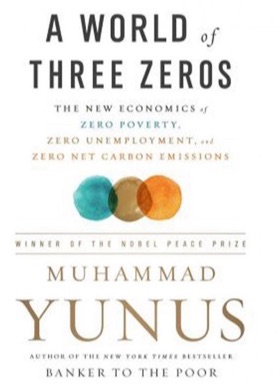Campus News
Free public talk by Nobel Peace Prize winner Muhammad Yunus, pioneer of microfinance, on Oct. 10
The public is invited to attend a free talk by microfinance pioneer Muhammad Yunus on Tuesday, October 10, in the College 9/10 Multipurpose Room at UC Santa Cruz.


In 2006, visionary economist Muhammad Yunus won the Nobel Peace Prize for his concept of “microfinance,” an anti-poverty strategy that provides small loans to entrepreneurs who are too poor to qualify for traditional bank loans. A decade later, Yunus is offering a prescription for global economic and environmental empowerment in his new book, A World of Three Zeros: The New Economics of Zero Poverty, Zero Unemployment, and Zero Net Carbon Emissions.
The public is invited to attend a free talk by Yunus on Tuesday, October 10, in the College 9/10 Multipurpose Room at UC Santa Cruz. The event begins at 7 p.m. The event is cosponsored by the Blum Center on Poverty, Social Enterprise and Participatory Governance at UC Santa Cruz and Bookshop Santa Cruz. Tickets are not required, but attendees can reserve their priority spot for the book signing by preordering a copy of A World of Three Zeroes from Bookshop Santa Cruz. Yunus’s talk will be followed by a question-and-answer session and book signing; copies of A World of Three Zeroes will be available for purchase at the event.
“We are delighted to partner with Bookshop Santa Cruz to bring Muhammad Yunus to Santa Cruz,” said Heather Bullock, a professor of psychology and the director of the Blum Center. “His vision of a new economic system offers a path toward the alleviation of human suffering caused by poverty and inequality, as well as the environmental destruction caused by capitalism.”
Yunus, a native of Bangladesh, shared the Nobel Peace Prize with the Grameen Bank, which he founded to provide micro-credit loans to the poor. Today he is a powerful voice for social and environmental justice.
His vision of a new economic system is based on altruism and innovation designed to serve human needs rather than accumulate wealth. Over the past decade, businesses have embraced this model to bring solar energy to millions of homes in Bangladesh; turn thousands of unemployed young people into entrepreneurs through equity investments; finance women-owned businesses across the United States; and bring mobility, shelter, and services to the rural poor in France. Around the globe, a support network helps young entrepreneurs launch start-ups.
A combination of vision, social action, and new financial tools is forging the future, according to Yunus, who says legal and regulatory changes are needed to foster the next wave of socially driven innovations.
“Yunus is inviting all of us to join this movement to create a better world,” said Bullock. “It’s a compelling, hopeful vision that’s needed now more than ever.”
At the event, parking will be available for $4 at the Core West parking structure at the corner of McLaughlin and Heller Drives; free shuttles will be available to transport attendees to the event.
The Blum Center on Poverty, Social Enterprise and Participatory Governance at UC Santa Cruz is part of a network of centers working on poverty across all ten UC campuses. UCSC takes a multifaceted approach to poverty alleviation, focusing on fiscal equity, housing, and food access. The center is dedicated to illuminating the causes and consequences of poverty and to demonstrating how participatory governance and effective policies and programs can alleviate economic hardship.